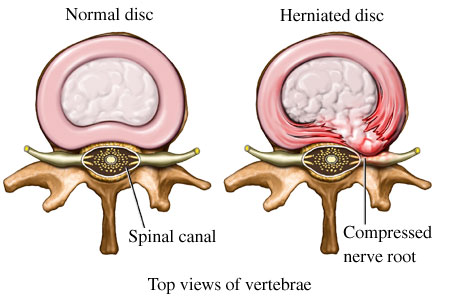People between the ages of 30 and 50 are most at risk for herniation because the elasticity and water content of the nucleus pulposus decrease with age. Not every herniated disc causes symptoms. In fact, many people discover they have a herniated disc after having an MRI or CT for an unrelated reason.
A disc can rupture suddenly, when too much pressure is applied to it all at once. For example, falling from a ladder and landing in a sitting position can cause a great amount of force on the spine. If the force is strong enough either a vertebra can break or a disc can rupture. Bending puts a large amount of stress on the discs between each vertebra. If you bend and try to lift something that is too heavy, the force can cause a disc to rupture. A disc can also rupture from a small amount of force, usually due to weakening of the annulus from repeated injuries that add up over time. As the annulus becomes weaker, at some point lifting or bending causes too much pressure across the disc. The weakened disc ruptures while doing something that five years earlier would not have caused a problem. This is due to the effects of aging on the spine, which is the most common cause of disc herniation in the thoracic spine. The material that has ruptured into the spinal canal from the disc can cause pressure on the nerves in the spinal canal. There is also some evidence that the material from inside the disk causes a chemical irritation of the nerve roots. Both the pressure on the nerve root and the chemical irritation can lead to problems with how the nerve root functions. The combination of the two can cause pain, weakness, and numbness in the area of the body to which the nerve supplies sensation (feeling).

Symptoms of herniated disc
Symptoms of a herniated disc may include dull or sharp pain, muscle spasm or cramping, weakness, tingling, or referred pain. Referred pain means that you have pain in another part of your part as a result of the disc problem. For example, if you have a bulging disc or a herniated disc in your low back (lumbar spine), you may have referred pain in your leg. This is known as sciatica—a shooting pain that can extend from the buttock into the leg and sometimes into the foot. Usually just one leg is affected. If you have a herniated disc in your neck (cervical spine), you may have referred pain down your arm and into your hand. Leg and arm pain caused by a herniated disc is also called radiculopathy. It’s very rare, but herniated discs can cause you to lose bowel or bladder control. If this happens, seek medical attention at once.
Seek immediate medical attention and call us anytime if:
- Pain is getting worse
- You have disabling pain
- Leg or arm pain, weakness, numbness, tingling
- Loss of feeling or weakness in your bladder or anus
- Loss of bowel or bladder control.